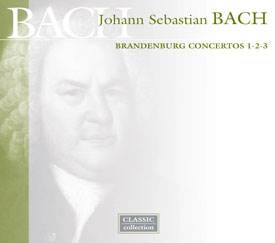This
disc was originally issued in 1990 on the now defunct Collins
Classics label. Happily, many of the recordings from this label
are now reappearing in other guises. Robert Haydon Clark was a
pupil of Thurston Dart. Dart devoted quite a bit of his life to
producing satisfactory solutions to some of the problems in these
fascinating works and Clark has included some of Dartís ideas
into these performances. The Consort of London is a modern instrument
band and this has influence some of the decisions. Clark substitutes
a French horn for Bachís tromba in the second concerto. And the
cadence in the 3rd concerto, which separates the two
movements, is replaced by the Adagio from Bach's Trio Sonata in
G major (BWV1038).
The
opening Allegro of the 1st concerto is crisply played
and the tuning is excellent, but it rather jogs along at too steady
a pace. I would certainly have preferred a livelier tempo. The
Adagio opens with a lovely oboe solo and all the solo playing
is of a very high order. The second Allegro is livelier than the
first, with beautifully sprung rhythmic shape and just the right
degree of bounce. This rhythmic shaping applies to the minuets
which are played in a very danceable manner.
The
solo playing is of an equally high order in the opening Allegro
of the 2nd concerto, but here the recorders sound a
little under powered compared to modern instruments. This balance
problem is remedied in the 2nd movement which has a
lovely chamber music scale, but here I felt that a hint of sourness
crept into the recorder tone.
The
group brought a fine chamber music feel to the performances of
the 3rd concerto. For me, the opening movement of this
concerto was played at rather too moderate an Allegro and there
were hints of untidiness in the rank and file solos. I am not
convinced about the insertion on the Adagio from the Trio Sonata
as the linking passage. It does not help that the Adagio is played
as a separate movement with a track separation rather than the
more conventional linking passage. But this is one of the eternal
problems of this work and it is good to hear different ideas and
solutions. The finale is played in an impressively brisk manner,
but I did not like the way that the end of the performance seemed
to just evaporate.
No
performance is going to satisfy everyone and performing these
works on modern instruments leads to some interesting balance
problems. It is to Robert Haydon Clarkís credit that this recording
is so satisfactory. These are attractive performances and much
thought has obviously gone into making them work on modern instruments.
The tempi are usually well judged and the phrasing is sympathetic
and stylish. The ensemble playing is crisp and well tuned, with
impressive solo contributions; especially notable is the David
Juritzís playing of the violino piccolo in the first concerto.
He manages to get a wonderfully warm tone from this tricky instrument.
If
you are interested in a well recorded modern instrument version
of these works, then do explore this recording. And even if you
prefer original instrument ensembles, at super budget price, this
recording is well worth exploring anyway.
Robert
Hugill

![]() Consort of London/Robert
Haydon Clark
Consort of London/Robert
Haydon Clark ![]() CLASSIC COLLECTION 99905
[43.13]
CLASSIC COLLECTION 99905
[43.13]